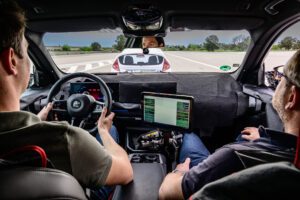The new BMW X3 is undergoing final chassis control and driver assistance systems tuning at the BMW Group test center in Miramas, France, to optimize handling and performance.
Throughout the testing process, the X3 has undergone evaluation in various conditions, including snow, ice, extreme heat and off-road terrain, and the vehicle’s suitability for everyday use was tested in urban traffic, country roads, highways and race tracks.

Engineers are using the test track at Miramas – various course layouts, including asphalt, slalom and off-road tracks – to refine the driving experience of the X3, with specific attention paid to acceleration, suspension, steering precision and braking behavior.
The tuning process is designed to ensure that the X3 delivers a typical BMW driving experience characterized by the company as precision, stability and versatility.
Enhanced driving dynamics and efficiency in the BMW X3 have been achieved through intelligent lightweight construction and refined aerodynamics.
The X3 features a wider track and reduced lift at the rear axle, increased body and chassis rigidity, and an improved steering ratio compared to its predecessor, BMW says. An adaptive suspension with electronically controlled shock absorbers will also be available as an option.
Equipped with the latest BMW iDrive system, the X3 has an expanded selection of automated driving and parking systems. These, according to BMW, exceed Euro NCAP safety test requirements and feature advanced sensor and software technology, including active lane change assistant and the parking and maneuver assistant.


